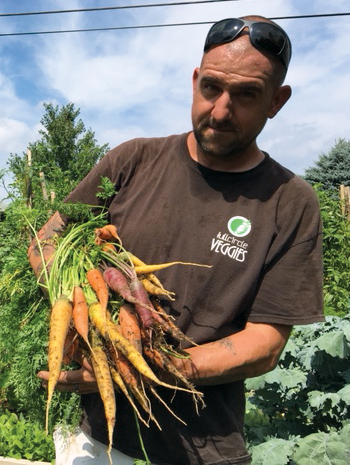There's nothing fresher or more faithfully organic than what you grow in your own backyard. Founder of Full Circle Veggies, Tim Delaney was a chef before he realized that the best way to procure quality ingredients was to grow them himself. Now, he takes the mystery and maintenance out of backyard homesteading for clients by planning, planting, even weeding and watering, making it easy to start sourcing your food right at home. Here's his best advice on starting a garden yourself.
Plants and Plots
Choose plants you know you like. Delaney offers over 100 varieties of vegetables for your garden, but sometimes sees food go to waste because it was chosen on a lark. Tomatoes, zucchinis and peppers are easy to put on the menu, but won't produce until late summer. In the meantime, consider early starters, like lettuce, to start tasting the fruits of your labor in spring. “If you're not going to buy it in the grocery store,” Delaney advises, “don't grow it.”
You'll need land that receives at least 8–10 hours of sunlight per day and that can be reached daily for watering once temperatures are over 80 degrees. Delaney is of the no-till school of
gardening, since “tilling breaks down what the soil is building itself,” but he does advise a layer of compost from a farmer whose organic habits you trust (or call Delaney for a delivery!).
Spring into Action
While there may still be snow on the ground, you can get started growing herbs from seed as early as February, if a little colony of sprouts is something you have room for indoors. “You can use old egg cartons, toilet paper rolls or newspaper bunched into a bowl with dirt in it,” Delaney says. Start cold season seeds in March, and tomatoes and peppers mid-April. Place them under a light or by a sunny window, keep them watered and give them a month before you put them outside.
If you only have space for a little container garden, herbs are your best bet. A container will dry out on a hot day in a couple of hours, but herbs can tolerate part shade and do well enough to provide you with pesto over the summer.
Challenges
Many new gardeners go astray by planting where there isn't enough sun, failing to provide consistent watering or planting too close together. “A tomato needs a foot and a half to two feet on each side,” Delaney says. “You can plant three in that space, but they'll produce as much as one.”
Water the soil in the morning rather than at night, when water on the leaves sits around creating a lovely damp environment for night-active slugs. Tomatoes especially don't like dirt splashed onto their lower leaves, and you're welcome to prune off leaves that are dragging in dirt or preventing good air circulation close to the ground.
Perhaps the furthest-reaching piece of advice Delaney has is to spend time with your garden. “It's only going to do good if you're out there,” he says. “If you're not out there picking and tending to it, if you're not experiencing it, you won't have success.”
Pest Control
Being among the plants also means you can monitor insect activity and make sure it's under control. “There's a bug war going on,” Delaney says. “Good bugs are eating bad bugs.” A strong, well-watered plant can fend off most insect attacks, but one service Full Circle Veggies offers is to ID and advise on mysterious visitors. “Send me a picture,” Delaney says. “I can tell you what to do.”
Larger plant predators, such as groundhogs and deer, call for measures such as fencing, motion-sensing sprinklers, trapping and other strategies tailored to your furry neighbors.
Compost and Cleanup
If you're interested in a compost tumbler, Delaney recommends them for breaking down waste throughout the year. “Put in anything that doesn't eat meat,” he says, i.e., avoid fish as well as dairy. Chicken manure, weeds and grass clippings that haven't gone to seed, vacuum dirt, dryer lint, hairbrush snarls and shredded newspaper can all find new life here. Keep it tumbling and aerated, and if it's broken down you can use it at the end of the year.
Clean up the debris of old plants that may harbor the eggs and larva of interlopers, and protect the soil from compaction with a buffering layer of compost and leaves. Next year, change up where you planted things so a plant's favorite nutrients don't get depleted. Delaney goes for a four-year rotation.

There's so much more to making the most of a vegetable garden. For help with everything, from planning to harvesting, preparing and preserving your crop, Full Circle Veggies can provide as much or as little assistance as you and your garden needs.
The Expert:
Tim Delaney
Founder, Full Circle Veggies
484.903.9093 | fullcircleveggies.com
















